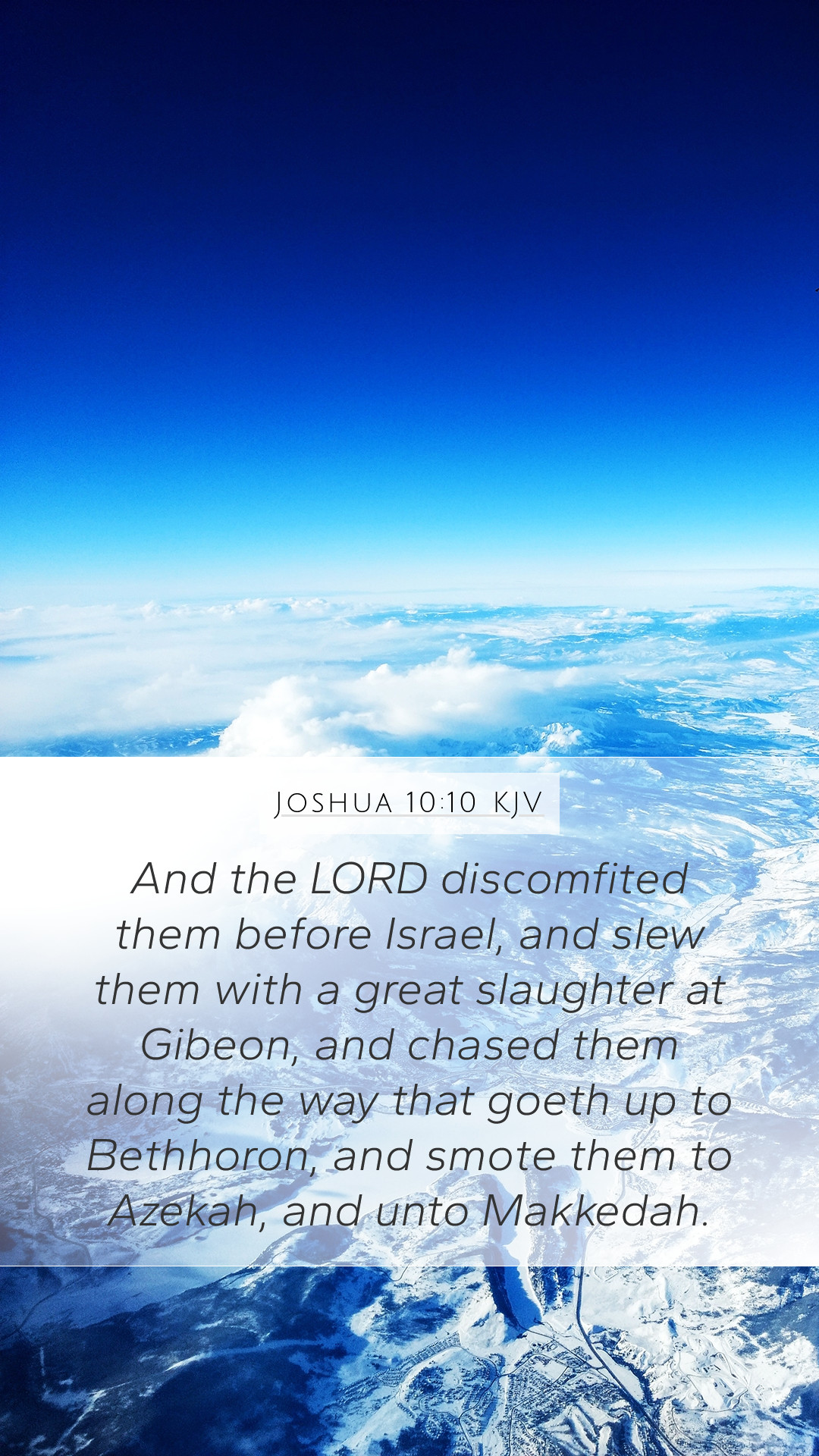Analysis and Commentary on Joshua 10:10
Bible Verse: "And the LORD discomfited them before Israel, and slew them with a great slaughter at Gibeon, and chased them along the way that goeth up to Beth-horon, and smote them to Azekah, and unto Makkedah." (Joshua 10:10)
Introduction
The verse from Joshua 10:10 holds significant meaning within the context of the Israelite conquest of Canaan. It highlights a divine intervention where God fights for Israel against their enemies. Understanding this verse involves grasping the broader narrative of Joshua's leadership, the people of Israel during their settlement in Canaan, and the nature of God's promises. With insights drawn from notable public domain commentaries, we explore the meaning of the verse in a comprehensive manner, examining biblical exegesis, commentary, and the historical backdrop.
Contextual Understanding
To fully appreciate the message of Joshua 10:10, it is crucial to consider the surrounding passages where the Israelites are engaged in battle against the Amorite kings. After the miraculous crossing of the Jordan River and the fall of Jericho, Joshua's leadership is put to the test as they face various enemies seeking to oppose their claim to the Promised Land.
Divine Intervention and Victory
Matthew Henry’s commentary emphasizes that the defeat of the Amorites is a direct result of God’s intervention. The term "discomfited" indicates a state of confusion and fear instilled in the enemy. This supernatural act reflects God’s promise to stand by Israel and fight their battles. The great slaughter at Gibeon signifies not only a military victory but also a fulfillment of God’s assurances to His people.
Strategic Warfare
Albert Barnes points out the strategic nature of the locations mentioned, such as Gibeon, Beth-horon, Azekah, and Makkedah. The routing of the Amorite forces illustrates a decisive military engagement where the Israelites were able to turn the tide of battle. This detail invites readers to consider the importance of geography in biblical narratives and military strategies employed by the Israelites.
Symbolic Meaning
Adam Clarke adds a layer of interpretation concerning the symbolism of the events. The physical battles faced by Israel can be seen as representative of spiritual conflicts in the life of believers. Just as Israel relied on God for victory, believers today are reminded of the necessity of divine support in overcoming life’s challenges.
Significance in Scripture
This verse relates to the overarching theme in the Bible that God is a warrior who fights for His people. It invites a deeper exploration of how God's involvement in human affairs is portrayed throughout Scripture.
Cross References
- Exodus 14:14: "The LORD will fight for you; you need only to be still."
- Deuteronomy 3:22: "You shall not fear them; for the LORD your God, He shall fight for you."
- Psalm 44:3: "For they got not the land in possession by their own sword, neither did their own arm save them: but thy right hand, and thine arm, and the light of thy countenance, because thou hadst a favor unto them."
Application to Daily Life
For modern readers, Joshua 10:10 serves as a reminder that when faced with formidable obstacles, the assurance of God’s help is unwavering. This not only enhances Bible study insights but also encourages believers to actively engage in prayer and seek God’s guidance in their own battles.
Conclusion
In summary, Joshua 10:10 stands as a powerful testament to God's faithfulness and intervention on behalf of His people. The combination of historical context, divine promise, and spiritual application enriches the understanding of Scripture and invites readers into a deeper relationship with God. Embracing these Bible study tools and Bible study resources can facilitate further exploration of such rich biblical passages.


